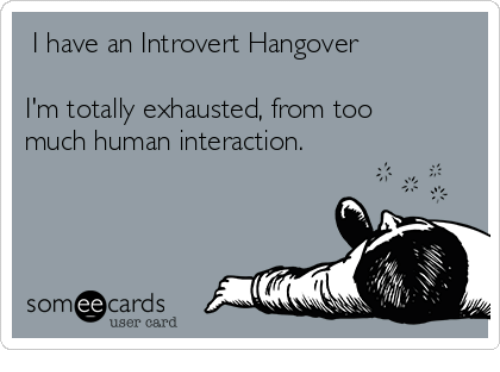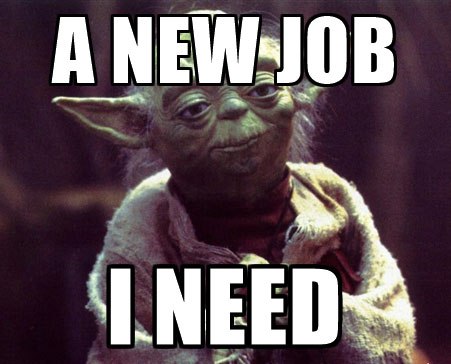The Art and Science of: Informational Interviews
“I never learn anything talking. I only learn things when I ask questions.” – Lou Holtz
Several years ago while working as a career advisor, I often found myself explaining the benefits of doing informational interviews. The idea is that a student who is still exploring career options should find someone in a job or field they are interested in; you invite them for coffee, and ask them a bunch of questions about their career path, what they like and don’t like about their job, and what advice they have for you.
It’s a fantastic way to not only learn about a career option from a candid, inside source, but also establish a strong networking connection. The days of handing out business cards to a few dozen people at a stuffy networking event are few and far between. No more awkward conversations with complete strangers. Now, students have a way of networking in a more structured manner – even introverts (like me) can get behind this!

Since I had seen so many students find success with informational interviews, and I had my own success with them in college, I figured, why should I ever stop doing them?
If it’s been a while, or if you have never done one, here is a quick how-to guide on how to do this!
(Just some) Reasons why an informational interview could be helpful:
- You want to determine whether or not a job/career/company may be a good fit for you
- You are considering switching industries and/or move your career in a new direction
- You need advice on where to volunteer/how to join a non-profit board
- You are exploring the idea of starting your own business
- You are a curious person and enjoy talking to people, at least a little bit 🙂
(Just a few) Ways to find someone to invite to an informational interview:
- Utilize your alumni network from your alma mater(s)
- Consider your existing network; you may not know someone who was a respiratory therapist, but I guarantee someone you know does!
- This is not always ideal, but go on a company website, find the person who has the job you want, and just email them. I have done this a few times when I had no other connections to help me find someone, and have gotten very positive results.
- Use LinkedIn!
(Just a few) Questions to ask during an informational interview:
- What was your career path that led you to where you are today?
- What type of education and/or experience is helpful or required for this type of role?
- What is your favorite thing about your job? Your least favorite thing?
- If you could go back and do anything differently on your career path, what might that be?
- What types of skills do you use on a daily basis?
- What have I not asked that you think is important to know when considering entering this field?
And remember, this does not have to just be about your professional goals – it can and should be about personal ones, too. Want to learn how to be a better cook? Reach out to the best cook you know and ask them about it.
An informational interview is the reason why I landed my first full-time job.
I graduated from college in 2009, a.k.a. the worst time in our country’s recent history to be looking for a job.
Almost one year prior to applying for what would be my first full-time job, I had done an informational interview with a career advisor in what would become my future office. She told me all about her career path, which turned out to be very different than some other folks I had spoken to in this field; learning a unique story was refreshing and comforting…I learned it was ok if I did not take a direct path.
About one year later I was working part-time in the box office at the Children’s Museum of Indianapolis and also as an intern at Ivy Tech Community College. Ivy Tech was growing, and my boss was extremely helpful in putting a good word in for me. As a result, I had 9 interviews in about 4 weeks…and I got turned down every. single. time. I had also just found out I was denied admission to the master’s program I applied to. It was a rough time.

I knew I wanted to be in higher education, so I checked local university job openings almost daily. One day, I saw a position in career services that I knew I wanted, which happened to be in the office my informational interview contact still worked in. I reached out to my contact I had chatted with a year prior, just to let her know I was applying and to thank her again for her time speaking with me. Like I had secretly hoped, she responded and said she would let her director know I was applying.
Because of that kind gesture, I got an interview. I was one of ten interviews to be exact. Job openings were so competitive during this time that I was one of a couple hundred applications; had I not met with her, I am convinced I would not have gotten an interview.
To this day, that is the best interview I have EVER had. Remember the 9 I had just done and failed at? Turns out they were wonderful practice. I got the job, and the rest, as they say, is history.
I learned that an informational interview will most likely not get you a job, but it can get you a much needed foot in the door – it’s up to you to take care of the rest. I also learned that doing an informational interview shows someone that you have a willingness to learn, you have initiative, and you are resourceful; all things a potential employer will most certainly like.
Since then I have never stopped reaching out to people to ask them questions. When I became an academic advisor I did one with my boss at the time, just to learn about what it was like to be a director of an advising office. I wanted to know if it was something that interested me, and if so, what kinds of things I should be doing over the next few years to position myself for a role like that. I ultimately decided that’s not what I wanted to do; I’m grateful that as a result I didn’t spend the next several years moving down a path just because it was what I thought I was supposed to do.
I have also done informational interviews to determine where I want to volunteer next, whether or not I want to be on a young professionals board for an organization, and more. And I did eventually get into that graduate program the following year after I was denied…because I did an informational interview with the program director to find out what my application lacked.
Still not convinced?
But wait, there’s more!
If you are feeling concerned in any way, the BEST part about doing these is:
People ALWAYS say yes.
Think about it. If someone emailed you saying that they were potentially interested in doing what you do for a living and they wanted to buy you a cup of coffee to learn more about your career path…you would definitely say yes, right? It feels great to share your story and be able to give advice to someone at earlier stages than you.
If nothing else, what’s the worst that can happen? They might say no. Will you look like a nerd? Possibly. But my experience has shown that people truly enjoy talking about what they do and their passions.
So give it a try!!! And as you do, consider this:
Who do you know – or who do you need to meet – that can provide you the insight you need to achieve your goals?
Leave a comment below sharing your informational interview stories or any questions you still have! Maybe a fellow blog reader is just the person you need to talk to next :).
2 Replies to “The Art and Science of: Informational Interviews”
Inspirational AND Informative
That’s what I’m shooting for!